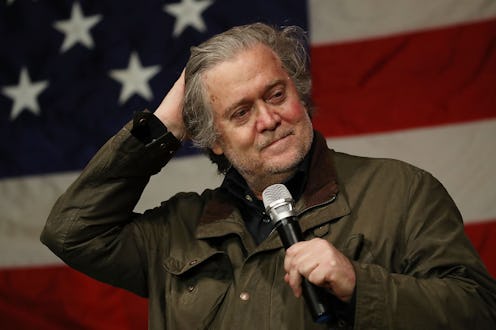News
The One Takeaway From Steve Bannon’s 'Fire & Fury' Apology You Really Need To Know

Steve Bannon's public feud with his former boss Donald Trump has pretty much taken over the headlines this week, after Bannon roundly criticized both Trump and his adult children in Michael Wolff's tell-all book, Fire and Fury: Inside the Trump White House. Now, Bannon has issued an apology of sorts — but the most important takeaway from Bannon's apology about Fire and Fury is that by issuing the statement, Trump's former chief strategist has essentially confirmed that he did actually make the comments attributed to him in the book.
Perhaps most incendiary were Bannon's comments about Donald Trump Jr. and his July meeting with Jared Kushner and several Kremlin-connected Russians, which Bannon called "treasonous" and "unpatriotic." In the apology, which Bannon gave exclusively to Axios on Sunday morning, he said, "Donald Trump, Jr. is both a patriot and a good man. He has been relentless in his advocacy for his father and the agenda that has helped turn our country around."
The offending words, Bannon said, were not directed at Don Jr., but instead at former campaign chairman Paul Manafort. "My comments were aimed at Paul Manafort, a seasoned campaign professional with experience and knowledge of how the Russians operate," Bannon said. "He should have known they are duplicitous, cunning and not our friends. To reiterate, those comments were not aimed at Don Jr."
Wolff also quotes Bannon as saying that special prosecutor Robert Mueller would “crack Don Jr like an egg on national TV,” another statement that drove Trump's allies to distance themselves from Bannon as the week went on. These comments and others attributed to Bannon in the book, like when Bannon called first daughter Ivanka "dumb as a brick," led the president to send a flurry of insults towards Bannon.
"When [Bannon] was fired, he not only lost his job, he lost his mind," Trump said in a statement disputing the veracity of Bannon's statements in the book. "Steve was a staffer who worked for me after I had already won the nomination by defeating 17 candidates, often described as the most talented field ever assembled in the Republican party.”
Trump, of course, meant to paint Bannon as unreliable and marginal and to say that his former chief strategist had given false statements to Wolff. While many people quoted in Fire and Fury have come out saying that the book featured quotes falsely attributed to them, however, Steven Bannon is not on of those people. And in fact, at no point in his apology does he claim that he did not make those statements.
Instead, Bannon merely expresses "regret" that he didn't respond to all of the furor over his statements sooner. "I regret that my delay in responding to the inaccurate reporting regarding Don Jr has diverted attention from the president's historical accomplishments in the first year of his presidency," Bannon wrote as the closing line of his apology. His focus, rather than denying the statements attributed to him, was instead an appeal to come back into the Trumps' good graces using a different, yet familiar, tactic: calling the media's work "inaccurate."
Denying that the quotes attributed to Bannon were actually his quotes would have been all too easy, as Trump himself has shown by calling the book a "work of fiction." The three hours of interviews that Wolff claims to have had with him, Trump said, were "in [Wolff's] imagination." And yet Bannon, who gave the book some of its most explosive content, did not say that the content was false. This would have been the perfect opportunity to do so, as the public feud between him and Trump is sure to pass out of the media's eye soon enough — but anyone wondering about how true the book is should take this as confirmation of anything that Bannon provided, at least.